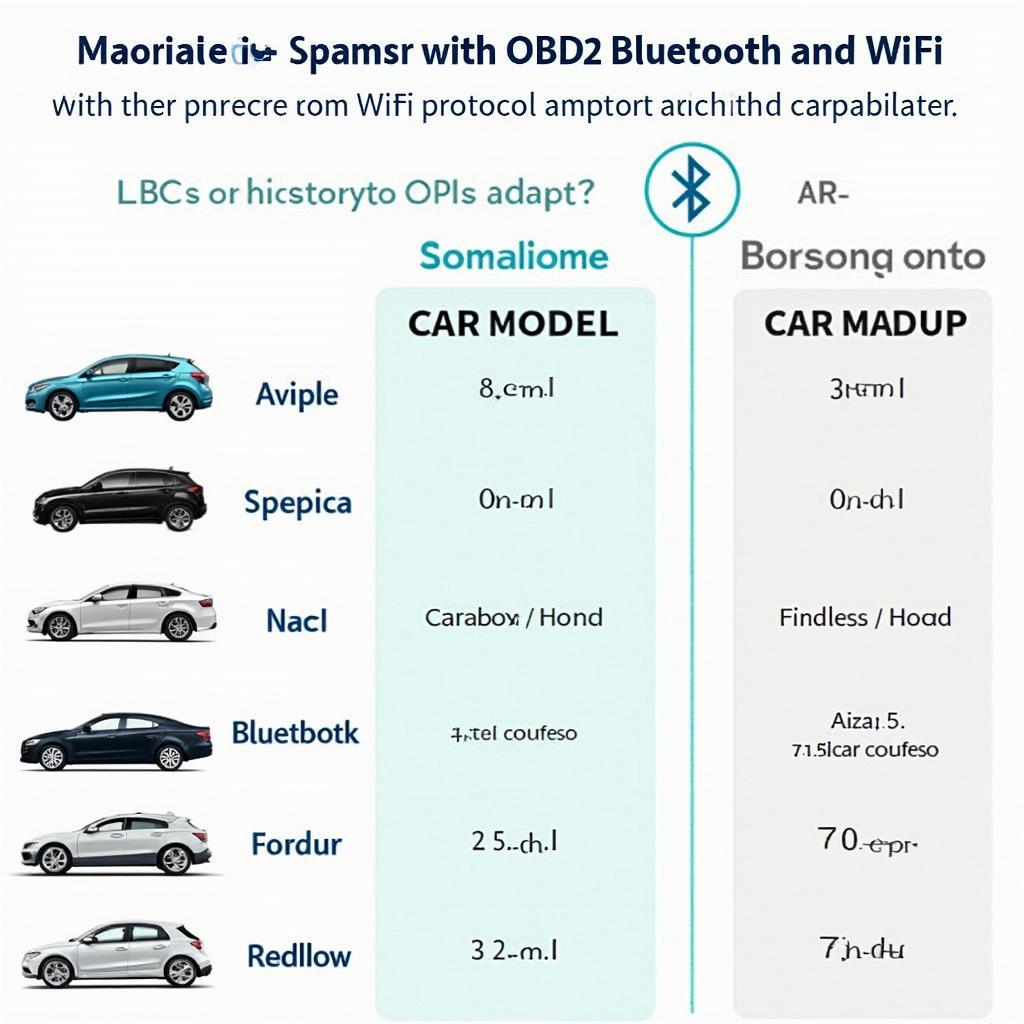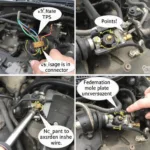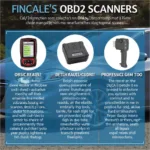OBD2 Bluetooth Wifi adapters have revolutionized car diagnostics, offering a convenient and affordable way to monitor your vehicle’s health. These handy devices provide a wireless connection to your car’s onboard computer, allowing you to access a wealth of information directly from your smartphone or tablet.
Whether you’re a seasoned mechanic or a car enthusiast, understanding the intricacies of OBD2 Bluetooth Wifi scanners can significantly enhance your diagnostic capabilities. This comprehensive guide will delve into the functionalities, benefits, and key considerations when choosing the right OBD2 Bluetooth Wifi adapter for your needs. Choosing the right adapter can be tricky, so we’ll explore everything you need to know to make an informed decision.
Choosing the Right OBD2 Bluetooth Wifi Adapter
Selecting the appropriate OBD2 Bluetooth Wifi adapter depends on several factors, including your vehicle’s compatibility, the diagnostic software you intend to use, and your budget. Not all adapters are created equal, and understanding the differences can save you time and frustration.
- Compatibility: Ensure the adapter is compatible with your vehicle’s make, model, and year. Most modern vehicles (post-1996) support OBD2, but it’s always best to double-check.
- Software Compatibility: Different adapters work with various diagnostic apps. Research and choose an adapter compatible with your preferred app or software. Some popular options include Torque Pro, OBD Fusion, and Car Scanner ELM OBD2.
- Bluetooth vs. Wifi: Consider the pros and cons of Bluetooth and Wifi connectivity. Bluetooth offers a more straightforward setup, while Wifi might provide a more stable connection, especially for data-intensive tasks like live data streaming. You can find more information on the obd2 scanner bluetooth vs wifi page.
- Protocol Support: Verify the adapter supports the necessary OBD2 protocols for your vehicle.
- Data Rate: A higher data rate allows for faster data retrieval, leading to a smoother diagnostic experience.
 OBD2 Bluetooth Wifi Adapter Compatibility Chart
OBD2 Bluetooth Wifi Adapter Compatibility Chart
Understanding OBD2 Protocols
OBD2 utilizes several communication protocols to transmit data between the vehicle’s ECU and the diagnostic tool. Knowing these protocols helps ensure seamless communication and accurate data retrieval. Common protocols include ISO 9141-2, ISO 14230-4 (KWP2000), ISO 15765-4 (CAN), SAE J1850 PWM, and SAE J1850 VPW.
Decoding the Protocols
- ISO 9141-2 & ISO 14230-4 (KWP2000): Older protocols primarily used in European and Asian vehicles.
- ISO 15765-4 (CAN): The most common protocol in modern vehicles, offering faster data transfer rates.
- SAE J1850 PWM & SAE J1850 VPW: Protocols predominantly used in Ford and GM vehicles.
Troubleshooting OBD2 Bluetooth Wifi Connection Issues
Occasionally, you might encounter connectivity problems with your OBD2 Bluetooth Wifi adapter. Here are some common issues and troubleshooting tips:
- Pairing Issues: Ensure Bluetooth is enabled on your device and the adapter is discoverable. Try restarting both devices.
- Connection Drops: Check for signal interference from other devices. Move closer to the OBD2 port.
- Software Glitches: Ensure you’re using compatible and updated diagnostic software. Try a different app. For those seeking a reliable adapter, check out the options available on the obd2 scanner bluetooth wifi adapter page.
The Future of OBD2 Bluetooth Wifi
OBD2 Bluetooth Wifi technology is continuously evolving, with advancements in data rates, security, and functionalities. The future holds exciting possibilities for integrating with other vehicle systems and providing even more comprehensive diagnostic capabilities. Are you wondering which is better, Wifi or Bluetooth OBD2? Our which is better wifi obd2 or bluetooth page provides a detailed comparison to help you choose the best option for your needs.
Emerging Trends
- Enhanced Security: Improved encryption and authentication protocols to protect against unauthorized access.
- Cloud Integration: Seamlessly upload and analyze diagnostic data in the cloud.
- Predictive Maintenance: Leveraging OBD2 data to predict potential vehicle issues before they occur.
“The integration of OBD2 Bluetooth Wifi with cloud-based platforms opens up a new era of predictive maintenance, empowering drivers to proactively address potential issues and optimize vehicle performance,” says Dr. Emily Carter, Automotive Diagnostics Expert.
“Wireless diagnostics is transforming the way we interact with our vehicles, offering unparalleled convenience and access to critical information,” adds John Davis, Senior Automotive Technician. For those interested in advanced car systems, you might find our article on android double din with bluetooth and wifi gps tpms obd2 informative.
In conclusion, OBD2 Bluetooth Wifi adapters provide a powerful and convenient solution for vehicle diagnostics. Understanding the various features, protocols, and troubleshooting tips ensures a smooth and informative diagnostic experience. Choosing the right adapter empowers you to stay on top of your vehicle’s health and performance. Looking for a specific OBD2 adapter that combines both Wifi and Bluetooth? Explore the obd2 elm327l v2.2 wifi bluetooth adapter for a versatile solution.
Need assistance? Contact us via WhatsApp: +1(641)206-8880, Email: [email protected] or visit us at 789 Elm Street, San Francisco, CA 94102, USA. Our customer support team is available 24/7.

